Related Research Articles
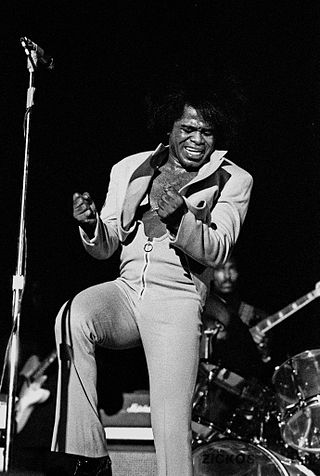
James Joseph Brown was an American singer, dancer, and musician. The central progenitor of funk music and a major figure of 20th-century music, he is referred to by various nicknames, among them "Mr. Dynamite", "the Hardest-Working Man in Show Business", "Minister of New Super Heavy Funk", "Godfather of Soul", "King of Soul", and "Soul Brother No. 1". In a career that lasted more than 50 years, he influenced the development of several music genres. Brown was one of the first ten inductees into the Rock and Roll Hall of Fame on January 23, 1986. His music has been heavily sampled by hip-hop musicians and other artists.

Polydor Limited, also known as Polydor Records, is a German-British record label that operates as part of Universal Music Group. It has a close relationship with Universal's Interscope Geffen A&M Records label, which distributes Polydor's releases in the United States. In turn, Polydor distributes Interscope releases in the United Kingdom. Polydor Records Ltd. was established in London in 1954 as a British subsidiary of German company Deutsche Grammophon/Schallplatte Grammophon GmbH. It was renamed Polydor Ltd. in 1972. The company is usually mentioned as "Polydor Ltd. (UK)", or a similar form, for holding copyrights.

"I Got You (I Feel Good)" is a song by the American singer James Brown. First recorded for the 1964 album Out of Sight and then released in an alternate take as a single in 1965 and included on the compilation album of the same name, it was his highest-charting song on the Billboard Hot 100 and is arguably his best-known recording. In 2013, the 1965 recording was inducted into the Grammy Hall of Fame.
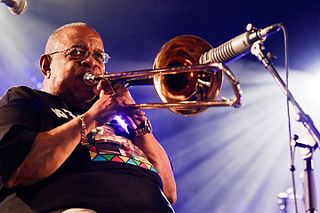
The J.B.'s was James Brown's band from 1970 through the early 1980s. On records, the band was sometimes billed under alternate names such as Fred Wesley and the JBs, The James Brown Soul Train, Maceo and the Macks, A.A.B.B., Fred Wesley and the New JBs, The First Family, and The Last Word. In addition to backing Brown, the J.B.'s played behind Bobby Byrd, Lyn Collins, and other singers associated with the James Brown Revue, and performed and recorded as a self-contained group. In 2015, they were nominated for induction into the Rock and Roll Hall of Fame but failed to be inducted and can be considered for Musical Excellence in the future. They have been eligible since 1995.

Gloria Lavern Collins, better known as Lyn Collins, was an American soul singer best known for working with James Brown in the 1970s and for the influential 1972 funk single, "Think ".

Live at the Apollo is the first live album by James Brown and the Famous Flames, recorded at the Apollo Theater in Harlem in October 1962 and released in May 1963 by King Records. Capturing Brown's popular stage show for the first time on record, the album was a major commercial and critical success and cemented his status as a leading R&B star.
Bobby Howard Byrd was an American rhythm and blues, soul and funk singer, songwriter, musician, record producer, bandleader, and talent dedicated. He played a part in the development of soul and funk music in association with James Brown.

"Please, Please, Please" is a rhythm and blues song performed by James Brown and the Famous Flames. Written by Brown and Johnny Terry and released as a single on Federal Records in 1956, it reached No. 6 on the R&B charts. The group's debut recording and first chart hit, it has come to be recognized as their signature song.

Michael Burton Brown is an American basketball coach who most recently served as the head coach for the Sacramento Kings of the National Basketball Association (NBA). Brown was previously the head coach of the Cleveland Cavaliers and the Los Angeles Lakers, as well as an assistant coach for the Golden State Warriors. He also served as the head coach of the Nigerian national team from 2020 until 2022, coaching the team at the 2020 Olympic Games.
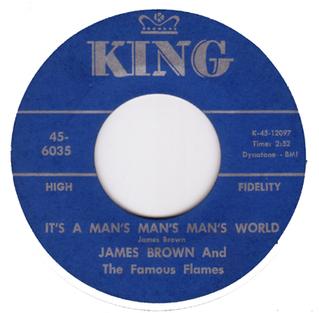
"It's a Man's Man's Man's World" is a song written by James Brown and Betty Jean Newsome. Brown recorded it on February 16, 1966, in a New York City studio and released it as a single later that year. It reached No. 1 on the Billboard R&B chart and No. 8 on the Billboard Hot 100. Its title is a word play on the 1963 comedy film It's a Mad, Mad, Mad, Mad World.

The Famous Flames were an American rhythm and blues, soul vocal group founded in Toccoa, Georgia, in 1953 by Bobby Byrd. James Brown first began his career as a member of the Famous Flames, emerging as the lead singer by the time of their first appearance in a professional recording, "Please, Please, Please", in 1956.
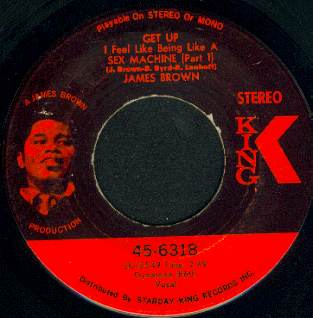
"Get Up Sex Machine" is a funk song recorded by James Brown with Bobby Byrd on backing vocals. Released as a two-part single in 1970, it was a no. 2 R&B hit and reached no. 15 on the Billboard Hot 100.

"Mother Popcorn (You Got to Have a Mother for Me)" is a song recorded by James Brown and released as a two-part single in 1969. A #1 R&B and #11 Pop hit, it was the highest-charting of a series of recordings inspired by the popular dance the Popcorn which Brown made that year, including "The Popcorn", "Lowdown Popcorn", and "Let a Man Come In and Do the Popcorn". The "mother" of the song's title was, in the words of biographer RJ Smith, "[Brown's] honorific for a big butt".

"(Do the) Mashed Potatoes" is a rhythm and blues instrumental. It was recorded by James Brown with his band in 1959 and released as a two-part single in 1960. For contractual reasons the recording was credited to "Nat Kendrick and the Swans".
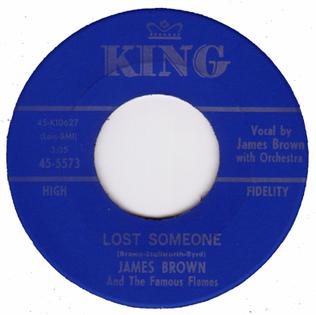
"Lost Someone" is a song recorded by James Brown in 1961. It was written by Brown and Famous Flames members Bobby Byrd and Baby Lloyd Stallworth. Like "Please, Please, Please" before it, the song's lyrics combine a lament for lost love with a plea for forgiveness. The single was a #2 R&B hit and reached #48 on the pop chart. According to Brown, "Lost Someone" is based on the chord changes of the Conway Twitty song "It's Only Make Believe". Although Brown's vocal group, The Famous Flames did not actually sing on this tune, two of them, Byrd and Stallworth, co-wrote it with Brown, and Byrd played organ on the record, making it, in effect, a James Brown/Famous Flames recording.
Over the course of his career James Brown owned and operated several different record labels, which he used primarily to release his own productions of artists associated with his revue.
"Talkin' Loud and Sayin' Nothing" is a funk song written by James Brown and Bobby Byrd. Recorded in 1970 by Brown and the original J.B.'s with Byrd on backing vocals and updated with a new melody, it was twice released as a two-part single in 1972. It also appeared on the album There It Is.
"Oh Baby Don't You Weep" is a song recorded in 1964 by James Brown and The Famous Flames. Based upon the spiritual "Mary Don't You Weep", it was recorded as an extended-length track and released as the first two-part single of Brown's recording career. It peaked at #23 on the Billboard Hot 100 and at #4 on the Cash Box R&B Chart.. It was the last original song featuring the Famous Flames to chart, not counting the 1964 re-release of "Please, Please, Please" and the 1966 B-side release of the Live at the Apollo performance of "I'll Go Crazy".
"Sexy, Sexy, Sexy" is a 1973 song written and recorded by James Brown, for the film Slaughter's Big Rip-Off. The song appeared on the film's soundtrack, and was released as a single in 1973. The song, and wider album, emerged from an era which saw the rise of Blaxploitation films. Such films represented the struggle of African Americans against poverty and crime under a white-dominated society. While Sexy, Sexy, Sexy was received well by contemporary and modern audiences alike, it received negative reviews from critics. Brown used the same backing track and chord progression from his 1966 hit Money Won't Change You when composing the song, which prompted such a poor critical response. Despite Brown's Plagiarism of his earlier work, Sexy, Sexy, Sexy showcased the typical funk hallmarks of his more popular work. The song performed strongly on three separate Billboard charts as well as the Cashbox chart. It appeared in three separate releases under music label Polydor Records and reissued in 2020.
"Regrets" is a 1980 single for James Brown. It was a hit for him that year, registering on both the Billboard and Cash Box charts.
References
- ↑ White, Cliff (1991). "Discography". In Star Time (pp. 54–59) [CD booklet]. New York: PolyGram Records.